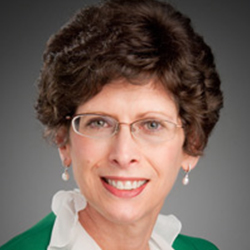Melissa Hudson, M.D., ’83, Oncology

What is your fondest memory of your time at McGovern Medical School?
My fondest memories are of the camaraderie shared in labs and study sessions as fellow students pooled their collective strengths to help each other master medical concepts and skills.
What are your hopes for today’s McGovern Medical School students?
So much of patient care is now focused on laboratory and other diagnostic testing rather than the history and physical exam. Physicians also spend a considerable amount of time charting in electronic platforms and documenting components of patient encounters to assure appropriate detail for optimal billing. I hope that our ready access to medical diagnostic tests and the increased burden of clerical duties does not translate into reduced time spent by future physicians in hearing the unique stories of their patients and performing a good physical exam.
What inspires you?
I am inspired by the resilience of patients and their families who deal so gracefully with the challenges of serious illnesses like cancer. It’s truly a privilege to participate in their care.
Who is your mentor?
I have had strong mentors in various aspects of my life. In my family, my grandmother and parents taught me that service to others is more satisfying to personal happiness than money or worldly goods. During my medical education, I had one main mentor who recognized my aptitude for pediatric oncology and guided me through difficult transitions in caring for terminally ill children. Finally, in my research career, I have had strong men and women who challenged me with new opportunities and took the time to provide positive feedback and constructive criticism that enabled me to succeed in a highly competitive academic environment.
What’s a day on the job like?
Up between 4 to 5 am for an hour on the treadmill (too many excuses not to exercise if I wait until the evening). On academic/administrative days (3 days/week), at least 50% of time is spent in research or administrative meetings or on conference calls, and the rest of time is devoted to working on research proposals and writing manuscripts. On clinic days (2 days/week), I spend 70% of time in direct patient care and the rest in educating graduate medical trainees or attending other educational forums. If I am lucky, I connect with my husband (also a physician) for a late dinner. Note – we are empty nesters, so this was not the schedule we kept when we had children at home!
What’s on your iPod?
Sorry – I am old school. I don’t have an iPod. I still have CDs (from Rock-n-Roll to Broadway show tunes) and listen to Public and Pandora Radio. My favorite station on the latter is Straight No Chaser.
What is the one thing you can’t live without and why?
Music and books!!! They both can elevate your mood and transport you to cultures and experiences outside your norm.
Who would you most like to meet (alive or deceased) and why?
I would like to meet Jesus Christ. His ministry focused on love for fellow man and acceptance of diversity was remarkable for its time and remains relevant today.
What has been your greatest adventure?
My husband and I visited mainland China in 1990–a time when no U.S. air carriers flew into Beijing. Young men and women served as our guides to incredible historical sites like the Forbidden City, the Great Wall, and the terracotta warriors. The limited retail shops consisted of government stores with handicrafts and books and magazines that featured stories described as “the truth about the student uprising at Tiananmen Square”. We readily appreciated the limited access citizens had to information and their interest in western culture. The biggest adventure of our trip was having the tickets on our return China Air flight not confirmed by the guide, which delayed our exit from the country. After several days, seats on a flight to Tokyo conveniently became available for an extra fee. We were never so appreciative to be back in U.S. where public services were safe and dependable.
What are your three all-time favorite books/magazines/blogs for leisure reading?
It’s hard to pick favorites because I read so many diverse authors. Some memorable titles include Whirlwind by James Clavell, Prodigal Summer by Barbara Kingsolver, and Cutting for Stone by Abraham Verghese